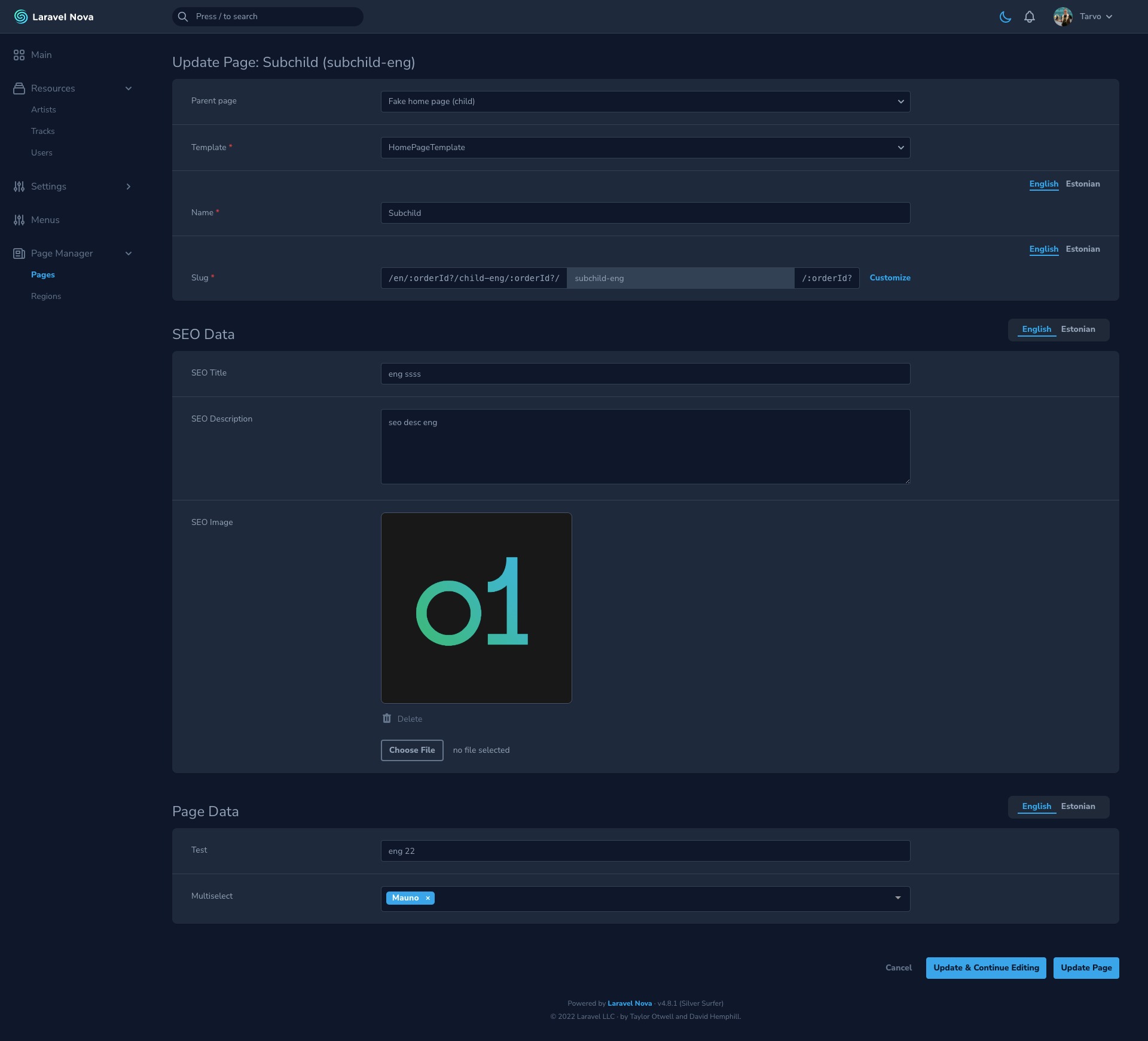This Laravel Nova package allows you to create and manage pages and regions for your frontend application.
- PHP >=8.0
- laravel/nova ^4.13
- Page and region management w/ custom fields
- Multiple locale support
Install the package in a Laravel Nova project via Composer and run migrations:
# Install package
composer require outl1ne/nova-page-manager
# Run automatically loaded migrations
php artisan migratePublish the nova-page-manager configuration file and edit it to your preference:
php artisan vendor:publish --provider="Outl1ne\PageManager\NPMServiceProvider" --tag="config"Register the tool with Nova in the tools() method of the NovaServiceProvider:
// in app/Providers/NovaServiceProvider.php
public function tools()
{
return [
// ...
new \Outl1ne\PageManager\PageManager()
->withSeoFields(fn () => []), // Optional
];
}Templates can be created using the following Artisan command:
php artisan npm:template {className}This will ask you a few additional details and will create a base template in App\Nova\Templates.
The base template exposes a few overrideable functions:
// Name displayed in CMS
public function name(Request $request)
{
return parent::name($request);
}
// Fields displayed in CMS
public function fields(Request $request): array
{
return [];
}
// Resolve data for serialization
public function resolve($page): array
{
// Modify data as you please (ie turn ID-s into models)
return $page->data;
}
// Page only
// Optional suffix to the route (ie {blogPostName})
public function pathSuffix() {
return null;
}All your templates have to be registered in the config/nova-page-manager.php file.
// in /config/nova-page-manager.php
// ...
'templates' => [
'pages' => [
'home-page' => [
'class' => '\App\Nova\Templates\HomePageTemplate',
'unique' => true, // Whether more than one page can be created with this template
],
],
'regions' => [
'header' => [
'class' => '\App\Nova\Templates\HeaderRegionTemplate',
'unique' => true,
],
],
],
// ...The locales are defined in the config file.
// in /config/nova-page-manager.php
// ...
'locales' => [
'en' => 'English',
'et' => 'Estonian',
],
// OR
'locales' => function () {
return Locale::all()->pluck('name', 'key');
},
// or if you wish to cache the configuration, pass a function name instead:
'locales' => NPMConfiguration::class . '::locales',
// ...To display a link to the actual page next to the slug, add or overwrite the closure in config/nova-page-manager.php for the key base_url.
// in /config/nova-page-manager.php
'base_url' => 'https://webshop.com', // Will add slugs to the end to make the URLs
// OR
'base_url' => function ($page) {
return env('FRONTEND_URL') . '/' . $page->path;
},You can overwrite the page/region models or resources, just set the new classes in the config file.
To customize the locale display you can use Nova::provideToScript to pass customLocaleDisplay as in the example below.
// in app/Providers/NovaServiceProvider.php
public function boot()
{
Nova::serving(function () {
Nova::provideToScript([
// ...
'customLocaleDisplay' => [
'en' => <img src="/flag-en.png"/>,
'et' => <img src="/flag-et.png"/>,
]
]);
});
}There's some cases where it's more sensible to translate sub-fields of a panel instead of the whole panel. This is possible, but is considered an "advanced usecase" as the feature is really new and experimental, also the developer experience of it is questionable.
You can create a non-translatable panel like so:
// In your PageTemplate class
public function fields() {
return [
Panel::make('Some panel', [
Text::make('Somethingsomething'),
Text::make('Sub-translatable', 'subtranslatable')
->translatable(),
])
->translatable(false),
];
}This will create a key with __ in the page data object. This means that the page data will end up looking something like this:
[
'__' => [
'somethingsomething' => 'your value',
'subtranslatable' => [
'en' => 'eng value',
'et' => 'et value'
]
],
'en' => [],
'et' => [],
]Helper functions can be found in the Outl1ne\PageManager\Helpers\NPMHelpers class.
Calls resolve() on their template class and returns all pages as a tree where child pages are nested inside the children array key recursively.
Calls resolve() on their template class and returns all pages. Returns an array of arrays.
Calls resolve() on their template class and returns all regions. Returns an array of arrays.
Finds a single page by its template slug (from the config file), calls resolve() on its template class and returns it.
Same as getPageByTemplate, but returns an array of pages.
Calls resolve() on the page's template class and returns the page as an array.
Calls resolve() on the region's template class and returns the region as an array.
The translation file(s) can be published by using the following command:
php artisan vendor:publish --provider="Outl1ne\PageManager\ToolServiceProvider" --tag="translations"You can add your translations to resources/lang/vendor/nova-page-manager/ by creating a new translations file with the locale name (ie et.json) and copying the JSON from the existing en.json.
Nova page manager is open-sourced software licensed under the MIT license.


